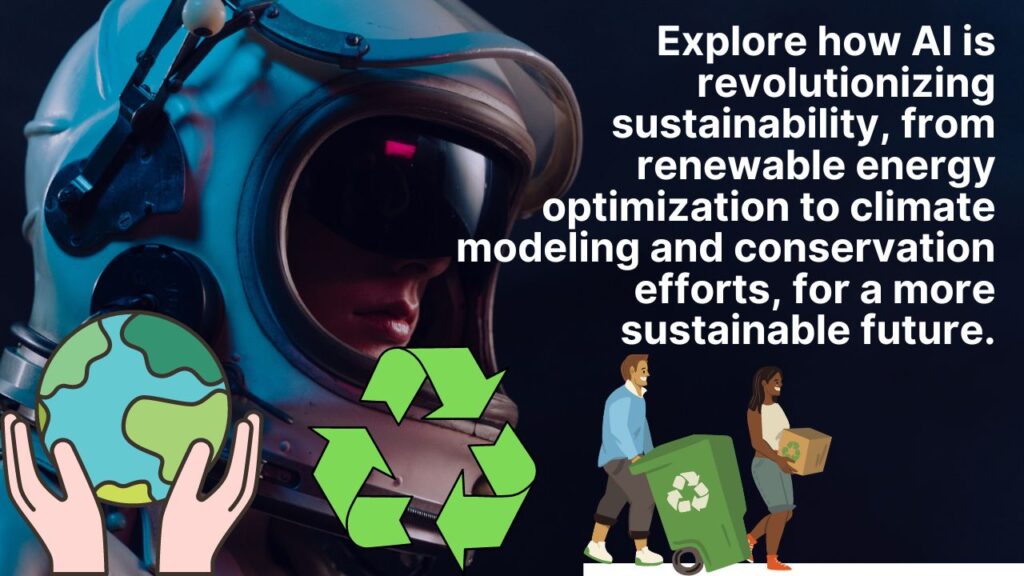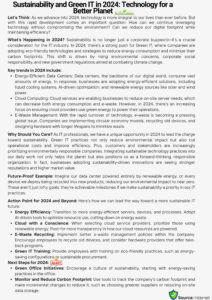
In an era marked by environmental challenges, Artificial Intelligence (AI) is emerging as a powerful tool for promoting sustainability and combating climate change. From optimizing energy consumption to managing natural resources and reducing waste, AI-powered solutions are revolutionizing how we address environmental issues. This article explores the diverse applications of AI in sustainability, highlighting its potential to drive innovation, foster collaboration, and create a more sustainable future for our planet.
Introduction: The Urgency of Sustainability
As the world grapples with the consequences of climate change, biodiversity loss, and resource depletion, the need for sustainable solutions has never been more pressing. The United Nations Sustainable Development Goals (SDGs) provide a framework for addressing these challenges and achieving a more sustainable future for all. AI, with its ability to analyze vast amounts of data, identify patterns, and optimize complex systems, holds immense potential to accelerate progress towards these goals. By harnessing the power of AI, we can develop intelligent solutions to address environmental issues and promote sustainability on a global scale.
AI in Renewable Energy
One of the most promising applications of AI in sustainability is in the field of renewable energy. AI-powered systems can optimize the operation of renewable energy sources such as solar panels and wind turbines, maximizing energy production while minimizing costs and environmental impact. Machine learning algorithms can analyze weather patterns, energy demand, and grid conditions to predict energy generation and consumption, enabling more efficient management of renewable energy resources. Additionally, AI can optimize the design and placement of renewable energy infrastructure, ensuring maximum efficiency and utilization of available resources.
AI in Climate Modeling and Prediction
AI is also playing a crucial role in climate modeling and prediction, helping scientists better understand and anticipate the impacts of climate change. Machine learning algorithms can analyze vast amounts of climate data, including temperature records, satellite imagery, and atmospheric simulations, to identify trends and patterns that inform climate models. These models can then be used to predict future climate scenarios, assess the risks of extreme weather events, and develop strategies for mitigating the impacts of climate change. By providing policymakers and stakeholders with actionable insights, AI-driven climate models can inform decision-making and support efforts to build resilience to climate-related risks.
AI in Sustainable Agriculture
Sustainable agriculture is another area where AI is making significant contributions, helping farmers improve productivity, reduce resource use, and minimize environmental impact. AI-powered systems can analyze soil data, weather conditions, and crop characteristics to optimize planting schedules, irrigation practices, and fertilizer application, maximizing yields while conserving water and minimizing chemical inputs. Additionally, AI can facilitate precision agriculture techniques such as drone-based monitoring and robotic harvesting, enabling farmers to manage their fields more effectively and sustainably. By promoting regenerative farming practices and reducing the environmental footprint of agriculture, AI is helping to build a more sustainable food system.
AI in Conservation and Biodiversity
Conservation and biodiversity are critical components of sustainability, and AI is being increasingly used to support efforts to protect and restore ecosystems around the world. Machine learning algorithms can analyze satellite imagery, sensor data, and wildlife tracking data to monitor habitat loss, species populations, and biodiversity hotspots. This information can then be used to inform conservation strategies, prioritize conservation efforts, and identify areas in need of protection. Additionally, AI can help detect and prevent illegal activities such as poaching and deforestation, enabling law enforcement agencies and conservation organizations to better protect endangered species and fragile ecosystems.
AI in Waste Management and Recycling
Waste management and recycling are essential components of a circular economy, and AI is playing a growing role in optimizing these processes and reducing waste generation. AI-powered systems can analyze waste streams, identify recyclable materials, and optimize sorting and processing operations to maximize resource recovery and minimize landfill waste. Additionally, AI can help optimize supply chains and logistics for recycling operations, reducing transportation costs and carbon emissions associated with waste management. By promoting a more efficient and sustainable approach to waste management, AI is helping to minimize the environmental impact of human activities and promote a circular economy.
Ethical and Social Considerations
While the potential benefits of AI in sustainability are vast, there are also ethical and social considerations that must be addressed to ensure responsible and equitable use of AI-powered technologies. Concerns have been raised about the potential for bias and discrimination in AI algorithms, particularly in applications such as predictive policing and credit scoring. Additionally, there are questions about data privacy and security, as well as the potential for AI to exacerbate existing inequalities and power imbalances. It is essential for policymakers, technologists, and stakeholders to work together to address these concerns and ensure that AI is deployed in a manner that promotes social justice, equity, and environmental stewardship.
Future Directions and Conclusion
Looking ahead, the future of AI in sustainability holds immense promise, with continued advancements in AI-driven technologies expected to further accelerate progress towards a more sustainable future. As AI becomes more sophisticated and accessible, we can expect to see even greater innovation and collaboration in addressing environmental challenges and promoting sustainability on a global scale. By harnessing the power of AI to analyze data, optimize systems, and inform decision-making, we can build a more resilient, equitable, and sustainable world for future generations. With collective action and a commitment to harnessing the potential of AI for good, we can work towards a brighter and more sustainable future for all.






